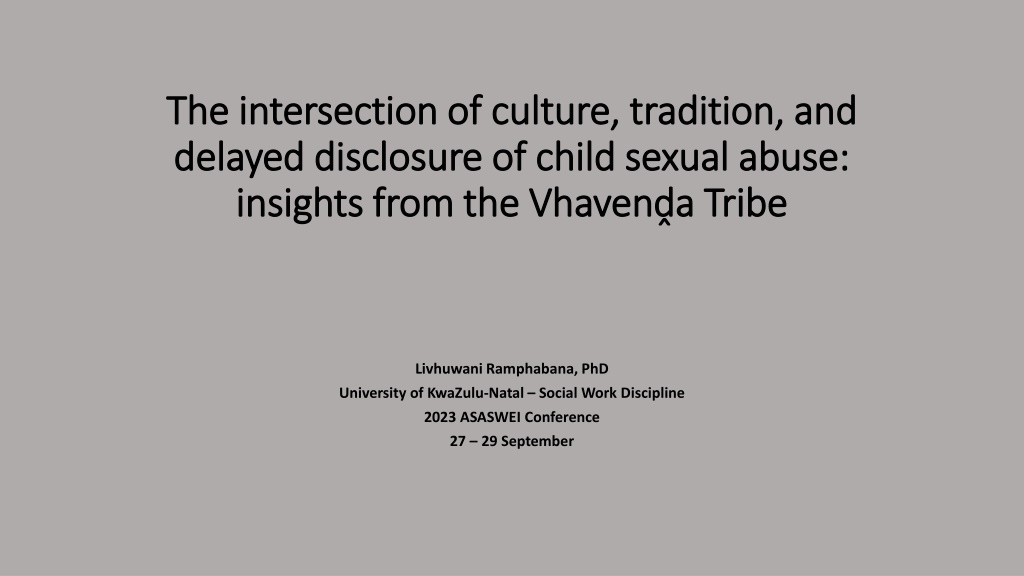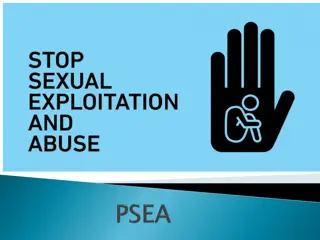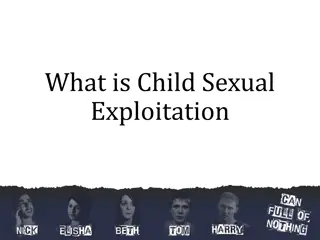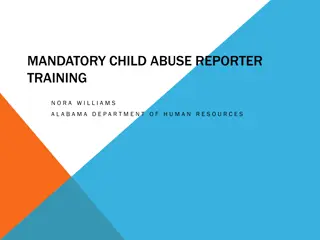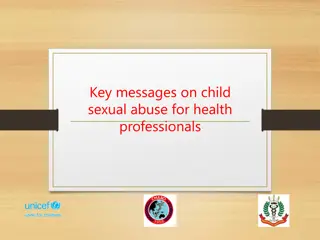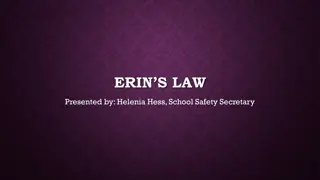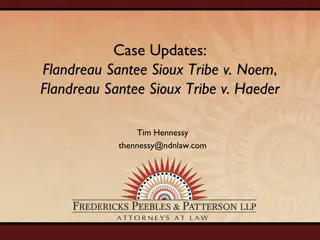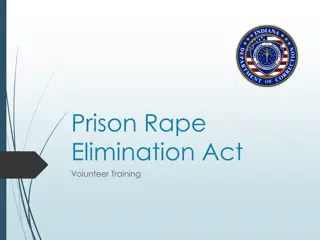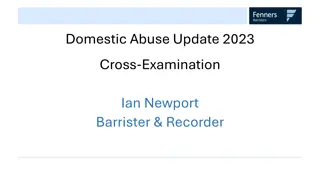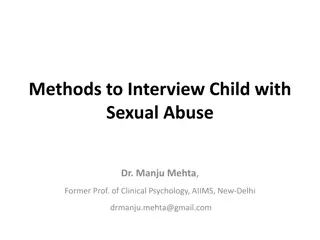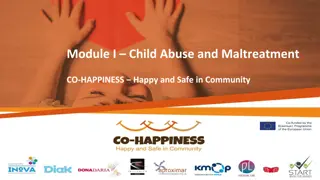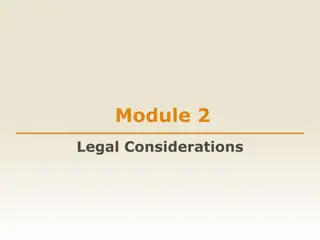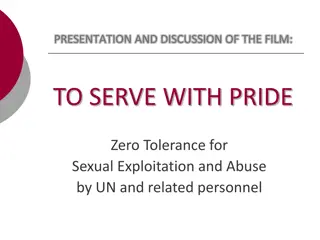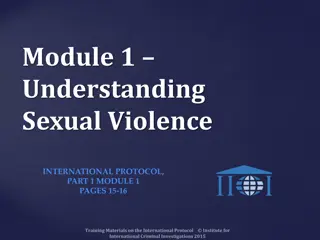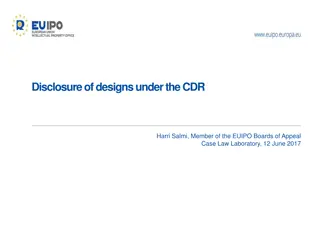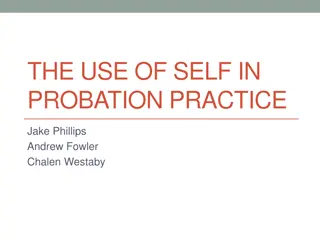Understanding Cultural Influence on Delayed Child Sexual Abuse Disclosure in the Vhavena Tribe
Exploring the intersection of culture, tradition, and delayed disclosure of child sexual abuse within the Vhavena Tribe. The study delves into the complexities of disclosure, the unique context of CSA in cultural norms, and behaviors, guided by the Afrocentric theory. Methodology involves interviews with survivors, caregivers, social workers, and traditional leaders in the Vhembe District.
Download Presentation

Please find below an Image/Link to download the presentation.
The content on the website is provided AS IS for your information and personal use only. It may not be sold, licensed, or shared on other websites without obtaining consent from the author. Download presentation by click this link. If you encounter any issues during the download, it is possible that the publisher has removed the file from their server.
E N D
Presentation Transcript
The intersection of culture, tradition, and The intersection of culture, tradition, and delayed disclosure of child sexual abuse: delayed disclosure of child sexual abuse: insights from the Vhaven a Tribe insights from the Vhaven a Tribe Livhuwani Ramphabana, PhD University of KwaZulu-Natal Social Work Discipline 2023 ASASWEI Conference 27 29 September
A brief context of CSA A brief context of CSA - It is a global social and health problem - It brings about several ramifications on child victims - The prevalence cannot be accurately comprehended due to underreporting - It is consequential to understand the dynamics of underreporting from cultural perspectives - In a unique context, CSA unfolds within a complex web of cultural norms and behaviors The intersection of culture, tradition, and delayed disclosure of child sexual abuse: insights from the Vhaven a Tribe
An overview of the Vhavenda Tribe An overview of the Vhavenda Tribe - Location - Language - Famous character - Traditional leadership The intersection of culture, tradition, and delayed disclosure of child sexual abuse: insights from the Vhaven a Tribe
Complexity of disclosure Complexity of disclosure - Disclosure is a complex and multi-tiered process - Child parent/caregiver (traditional leadership) authority (success of disclosure) - Only the success of disclosure affords child victims an opportunity to receive necessary professional support
Purpose of the study Purpose of the study To understand the intersection of culture, tradition, and delayed disclosure in the context of the Vhaven a tribe - The study was guided by the Afrocentric theory
Methodology Methodology - Design: exploratory - Setting: Vhembe District, Rural - Sampling: 4 adult survivors of CSA, 7 caregivers of survivors of CSA, 4 social workers, and 2 traditional leaders - Gatekeepers permission: TREC UL, DSD, DoE, and traditional leaders - Interviews language: Tshivenda and English
Findings of the study Findings of the study - Thematic analysis was done - Four themes emerged: Traditional mechanisms to handle disputes Arranged hook-up and marriage Family negotiations Using idioms and proverbs as defense and coping mechanisms
1. Traditional mechanisms to handle disputes 1. Traditional mechanisms to handle disputes - Restitution and compensation It is actually insane that the chief wanted me to consider negotiating with the family of the person who sexually abused my child. All I needed was the help from the chief to call police to intervene, not to negotiate or settle the matter without involving the police. Caregiver - Shortcomings of traditional leaders in handling CSA cases The majority of traditional leaders do not seem to understand the weight of such cases because in some situations they act as mediators when cases are reported to them. Social worker
2. Arranged hook 2. Arranged hook- -up and marriage up and marriage - This practice used to be prevalent previously in the context of Vhavenda - Its implications on the child cognition The person who abused me was the very same person whom my mother had been forcing me to be in an affair with. It took me time to talk about it because I felt it would not make any change because my mother would not support me. Victim
3. Family negotiations 3. Family negotiations - Families only report the abuse incidents only when they disagree - If the elders strongly recommend not disclosing the incident, then professionals will not know about it - Sometimes it depends on the gravity of the abuse: contact vs non-contact Most of cases that come to our offices, you would find out that the abuse happened some time ago but delayed by the process to negotiate within families. Social worker
4. 4. Using idioms/proverbs as defence and Using idioms/proverbs as defence and coping mechanisms coping mechanisms - U shavha u dzhena ari usina mmbwa - Muhulwane u kanda mupfa a tshi u vhona - Vhathu ndi anga dza kholomo vha a ku ana - Mmbwa ya a i we ai noni
Conclusions and implications Conclusions and implications - It is important to embrace culture and traditions, but that should be within the human rights principles and legal ambits - Social workers should diligently work with traditional leaders to confront practices that perpetuate abuse and delay the disclosure - Social workers should provide capacity-building training for TLs on how to handle CSA (what their roles are and not)
.. Conclusions and implications Conclusions and implications - Promote collaboration amongst key stakeholders to have a coordinated response to CSA - Strengthen local child protection agencies in rural areas
Closing remarks: Closing remarks: Let us work together to make our cultures more responsive to the children s needs for protection against abuse.
I thank you I thank you
